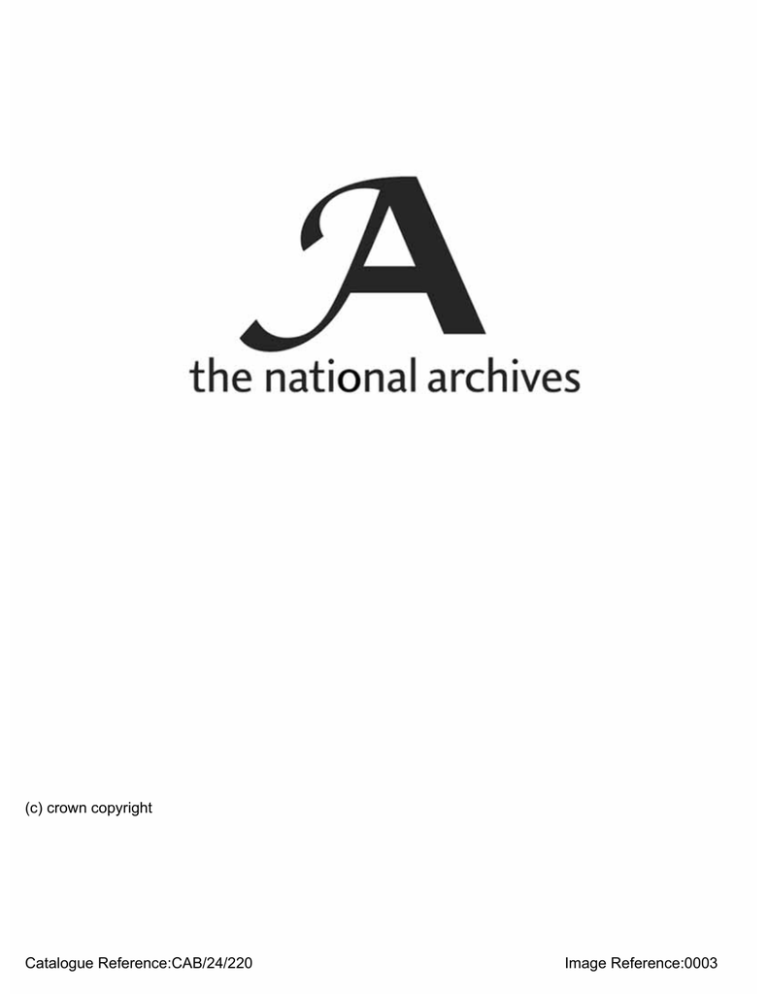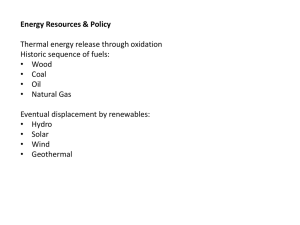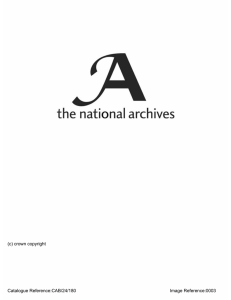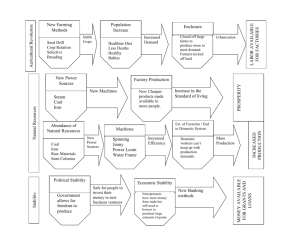(c) crown copyright Catalogue Reference:CAB/24/220 Image Reference:0003
advertisement

(c) crown copyright Catalogue Reference:CAB/24/220 Image Reference:0003 H DOCUMENT IS THE PROPERTY OF HIS BRITANNIC MAJESTY S G Q V E R M G N T . f ,P, 75 (31). Copy N o . ^ C A B I N E T . THE COAL SITUATION. Note by the President of the Board of Trade. I circulate, for the information of my colleagues, two notes which have been prepared in the Mines Department on (1) the industrial position in the coal mining industry and (S) the operation of Part I of the Coal Mines Act, 1930. Board of Trade, 23rd March, 1931. *5 F 6J J Z Jk The Coal Mining Situation. (Wages and Hours of w*ork) . As the present crisis has arisen largely out of the operation of the statutory restrictions upon working hours, it is necessary to give a brief historical summary of those restrictions. The Coal Mines Act 1908 limited the Daily hours of underground'-- workmen in Coal mines to 8, In 1919 the limit was reduced, by the Coal Mines Act year, to 7. of that The Coal Mines Act of 1926 had the effect of temporarily restoring the 8 hour day - but for a period of 5 years only. At the end of the 5 years viz: on July 8th 1931, there was to be a reversion to the 7 hour day. This, then, was the position when Part III of the Coal Mines Act 1930 came into force on 1st December last. Coal Mines Act 1950 (Part I I I ) . It was the original intention of the present Government to restore the 7 hour day last year, (i.e. not to wait for its automatic restoration in July 1931): but owing to the economic conditions in the industry, it v/as eventually decided to effect the restoration in two stages. Accordingly, Part III of the 1930 Act provided a 7-g- hours maximum to take effect from 1st December 1930. During the passage of the Bill through Parliament, a proviso was inserted the effect of which was to allow districts to work (until July 1931) in excess of 7 ^ per day, a s long as they did not work more than an aggregate of 90 hours per week. Working agreements of this type are known as "Spreadover" agreements, and can be authorised by the Board * The hours of surfacemen are not restricted by law, but are subject to agreement between employers and employed. of Trade, on the application of hoth sides in the district concerned, if (and only if) "both the Mining Association and the Miners' Federation approve. ^Spreadover" Agreements. "When Part III of the Act came into force on 1st December last, four districts, v i z . Yorkshire, Nottinghamshire, North Derby and Kent were already working a 7^ hour day, and were not affected. Of the remaining districts, a certain number immediately concluded new agreements on a 7-k hour day basis. In the remaining districts, the workmen declined to accept the various reductions of wages proposed by the owners to meet the reduction in working time, and fell back on one form or other of spreadover arrangement. The position during December was, however, additionally complicated by the refusal (at that time) of the Miners'- Federation to give their approval to "spreadover" at all, and the consequent inability of the Board of Trade to issue legalizing Orders^, . (The Mining Association gave their approval in all cases). The National Board. Another provision of the Act of 1930 was the setting up of the National Industrial Board for the Coal Mining Industry. This body was to comprise representatives of the Mining Association and the Miners' Federation, as well as some independent members. Its chief function was to "enquire into and report upon" any disputes as to the terms of a proposed district agreement, which might be referred to the Board by either party concerned in such dispute. Board has no compulsory powers whatever. The The Miners' Federation duly nominated their representatives for the Board, but the Mining Association refused to have anything to do with it in conformity with their declared policy of leaving all wages,etc., agreements to be negotiated in the district, without any kind of outside or "national" interference. In view of this attitude, the Secretary for Mines had no alternative hut to secure for the Board such other representatives of the coal owning element as he could. District disputes were referred to the Board during November and December, and were reported upon, and in one or two cases the Board's suggestions for district agreements were accepted by both sides. In other cases the owners concerned refused to accept them. The most important of these latter oases was that of South Wales. South VTaleS:. During the month of December, in the absence of any agreement for work on the basis of a 7-s- hour day, work was carried on temporarily on a "spreadover" basis of an 8 hour day and an 87 hour fortnight, with no reduction in wages. The workmen's side then referred their case to the National Board, and at the end of December the Board issued a report recommending a new agreement on a "spreadover" basis. The workmen accepted this proposal, but the owners (who did not appear before the Board) refused it, and posted terms for a 7^ involved heavy wage reductions. hour day which In the absence of any agreement, there was then a practically complete stoppage of the South Wales mines, which lasted for 3 weeks. During this period prolonged negotiations were conducted by the President of the Board of Trade and the Secretary for Mines with a view to bringing the two sides together. These negotiations were ultimately successful, and resulted in the signing of a preliminary agreement in London. Briefly, this agreement provided for the meeting of the parties again in Cardiff, and the drawing up"of a new Conciliation Board agreement on the lines of previous agreements, to cover a period of 3 years, and on the basis of a 7 % hour day. It further provided that in the absence of agreement between the parties upon two important matters v i z . the minimum percentage and the pibslatence wage - either or both of these points should be Referred for decision to an independent arbitrator (to be appointed by the Lord Chief Justice). Work was then resumed.in louth Wales on the basis of a 7-g- hour day and with no reduction n wages pending the award of the arbitrator, which was to take ffeot as from March 1st. The arbitrator (Mr. F.P.M. Schiller, .0.) issued his award a few days ago, and it involved appreciable eductions both in the minimum percentage and in the subsistence wage rates. These decisions came as a very unpleasant surprise to the workmen., and the men employed at one or two mines immediately came out on strike by way of protest. A delegate conference was then held in Cardiff, and the award was strongly condemned. Proposals for strike action were, however., deferred in favour of an appeal for the support of the Miners' Federation. Another delegate conference was held in Cardiff on Saturday, Slat *Maroh, to hear the Federation s decision. 1 After consider­ able discussion it was decided by a very small majority to continue working the Schiller award and to await the result of the representations made to the Government by the Miners' Federation of Great Britain. The "Spreadover" position. As previously stated, a number of districts worked illegal "spreadovers" during the month of December, in the absence of the approval of the Miners' Federation and Orders by the Board of Trade. In January the Federation changed their attitude, and gave a general approval to all the existing "spreadover" agreements, such approval, however, holding good only till 31st March. A list of these "spreadover" agreements, which were then legalized by Orders of the Board of Trade, is attached. It will be observed that the Scottish agreement terminated on February S8th, but it has since been renewed until the end of June. Application has not, however, yet been made to the Board of Trade for a fresh Order, and in any case such Order cannot extend beyond 31st March (the limit of the al of the Miners' Federation). Scotland, therefore, is now -orising illegally. '£ he Mine^re-^' ^jgX^hJi2EJ&Q£JL£J^U. A t a delegate conference of the Federation held last Thursday, the position in South Wales and the general question of the renewal o f " spreadovers" after March 31st were "both considered; and (contrary, it is believed, to the advice of the Federation'3 Executive) it was decided (l) not to sanction any spreadover working fter March 31st, (2) to meet the Government and demand the immediate amendment of the Goal Mines Minimum Wage Act of 1912, hy the passing of Mr. Potts 1 Bill. The Present^Posit ion. These decisions of the Federation, which were quite unexpected, have brought about a situation fraught with considerable difficulty. In brief, it may be said that they indicate (a) a refusal to forego t h e right to a general reduction of hours to 7% under the 1930 Act, and (b) a refusal to accept the reductions of wages consequent upon such reduction of hours. (in the case of South Wales, and of one ether district - Bristol - the reductions in question are not the owners' proposals, but represent the awards of independent arbitrators­ t h e workmen as well as the owners having previously pledged themselves t o accept the arbitrators' awards). With regard to the proposal to amend the Minimum Wage Act of 1912 by Mr. Potts' Bill (which was introduced last year), it may be said at once that this is impossible of acceptance. The Bill, (as previously drafted) provides for minimum wages for the various classes of workmen, all over the country alike, at such rates as would (it is estimated) add 3/- to 4/6d. per ton to the cost of coal. (This proposal cannot however be dealt with in any detail in the present note. ) With regard to the "spreadover", the Federation's decision means that those districts at present v/orking on such agreements will, after the 31st March, either have to change over to a 7-g hour day, and accept considerable wage reductions (as indicated by the South Wales and Bristol awards), or continue to work "spreadovers" without the authorisation of the Board of Trade, and therefore in contravention of the law. It is true that such illegal working was done in some cases last December, in the confused conditions which obtained just after the coming into force of Part III of the Act. But a deliberate renewal of such illegal working at this stage, and on a large scale, will introduce a problem of a much more difficult kind, and it will be for the Government to consider what action is to be taken if such a thing happens as a result of the Federation's recent decision. We have reason to believe that in some cases, "at any rate, there is every intention of continuing 1 to work on a "spreadover" basis in defiance of the law. *Certainly in Scotland. 9; ^ r l-J s. i, LIST UP DISTRICTS YfHEBE "SPREADOVBR" IS OPERATING. District *icotland* Date on which Order expires. 28th February, 1931, South Derbyshire 31st March, 1931. Leicestershire 31st March, 1931. ftannock Chase 31st March, 1931. Lancashire and Cheshire 31st March, 1931. North Staffordshire 31st March, 1931. Cumberland 31st March, 1931. North Wales 31st March, 1931. South Staffordshire and East Worcestershire 31st March, 1931. Shropshire 3ristol No Order made (Men's side will not apply) , 31st March, 1931. **New agreement, involving spreadover to end of June on approximately same terms as before, has been signed. Application for new Order will be sent as soon as Miners' Federation decide to approve. 0?Q Co 5 U THE GOAL POSITION. Part I of the Coal Mines Act, 1930, provided, broadly­ speaking, for the regulation of output in accordance with demand and the determination of minimum prices, which were to be co-ordinated by the Central Council, composed of representatives of the coal owners in all districts. The object of this Part of the Act was to prevent excessive competition between the various districts. Tho Central Council fixed the total permitted output for the whole country for the quarter ending 31st March, 1931, at about 10-' below the actual output in the March Quarter, 1930, and they divided this output among the various districts. The Midland (Amalgamated) District (Yorkshire, Notts., Derby and Leicester) were allotted a quantity of just over 19 million tons, but although they had the right of immediate appeal to arbitration, they did not exercise that right. Durham, Northumberland and other districts fixed their minimum prices in advance of the Midland Area, and claim that the Midlands, which delayed their determination of prices, seized the opportunity to undercut other districts in an attempt to secure more trade. At the same time they failed to limit their production in January and February to the figure permitted by the allocation, no doubt hoping that they would be able later on to secure a further allocation from the Central Council. In the middle of February an application for an increased allocation waa made by the Midland (Amalgamated) District. Those districts which were aggrieved by the action of the Midland coo-lowners in cutting prices and ignoring the regulation of output opposed the a-pplication when it camo before the Central Council, and the application was refused. The Midland (Amalgamated) District exercised their right of appeal to arbitration, but the arbitrators supported the decision of the Central Council. The action of the Central Council in making the original allocation 10$ below the output in the corresponding quarter of last year (when output was. abnormally high) would appear to have been justified bjr the course of trade during the quarter. The total output of the country as a whole up to the end of February was more than 5 million tons below the output permitted for the period. The principal deficiencies were in South Wales, Scotland and Durham. It is clear, therefore, that demand has not been equal to the permitted output and that the Coal Mines Act has not been responsible f o r restricting output. It is als-*i clear that the regulation of output has been successful except insofar as it has been affected by the action of the Midland (Amalgamated) District. While it is true that there is some shortage of coal from the Midlands, there is no general shortage, and a good deal of the publicity that has been given to the question of shortage has been ill-informed and possibly has b e e n instigated by some of the collieries In the Midlands in order to force the hands of the Central Council and thus secure what they failed t o get at the hands of the arbitrator. It is obviously difficult for a Government department to say whether in any given case there is a shortage or not; but the evidence in the possession of the Department, which is confirmed from reliable trade sources, is that while there may b e isolated cases of difficulty, in the main there is no shortage of coal supplies. Certainly house coal supplies are not inadequate - although temporarily certain qualities may be difficult to procure. subject are untrue. Many statements in the Press on this The Daily Express published a statement that Hotherham was entirely without coal. Simultaneously a Sheffield paper denied this, and a representative of the Department after a personal investigation reported that he 0 O to ( *od had no evidence of any shortage. It was reported in the Press and Parliament that a Birmingham Co-operative Oociety had to ration its consumers. Yet offers of suitable coal made to this bociety were declined, "because they had no need of coal. The reports of the importation of Polish coal into this country for the use of trawlers are also untrue. The latest information in the possession of the Department is that the difficulties of the trawler owners are limited to the smaller men who normally live from hand to mouth; but that even in these cases sufficient coal is available to prevent trawlers from being laid up, The National Committee of Investigation set up under Section 5 of the Coal Pines Act, 1930, has investigated complaints from the Coal Merchants' Federation end others, and have reported that after a careful examination of the situation "they were not satisfied that there was any shortage, "while there might be isolated cases of shortage, these could be met from other sources of supply in Great Britain,'' It should be added that as recently as last Tuesday the Midlands applied to the Central Council for a further allocation of ^ million tone for the month of March, but their application was rejected, and they did not refer the decision to arbitration. There can be no charge of inelasticity m^de against the Central Council. They have already granted increased allocations t o the small districts of Somerset and Kent, who might well fear that they would not get fair treatment from the larger districts. To sum up, there is no general shortage of coal, and evidence is accumulating that supplies from other coalfields are available to meet practically all the isolated cases of shortage that are occurring. It may b e that temporarily different qualities of coal may have to he used,, The situation is such "that there is no cause for alarm, although there may he temporary inconvenience during the last fortnight in March in some isolated cases to consumers whose supplies have been drawn from the Midland area. Seeing that the coal owners are not prepared to make a further allocation to the Midland area for this last fortnight of the quarter - they are supported by the decision of the Central Investigation Committee referred to above - the only way by which the Government could remove the inconvenience which, it is admitted, is occurring in some cases, v/ould be by the amendment or suspension of Part I of the Coal Mines Act, 1950. Such -£Action would undermine the whole authority of this Part of the Act and would certainly lead to a repetition of the present situation in subsequent quarters, and would cause chaos and disorganisation at a time when it is reasonable to hope, if the authority can b e maintained, that it will bring organisation to the industry and a greater measure of prosperity than it has experienced in recent years.





